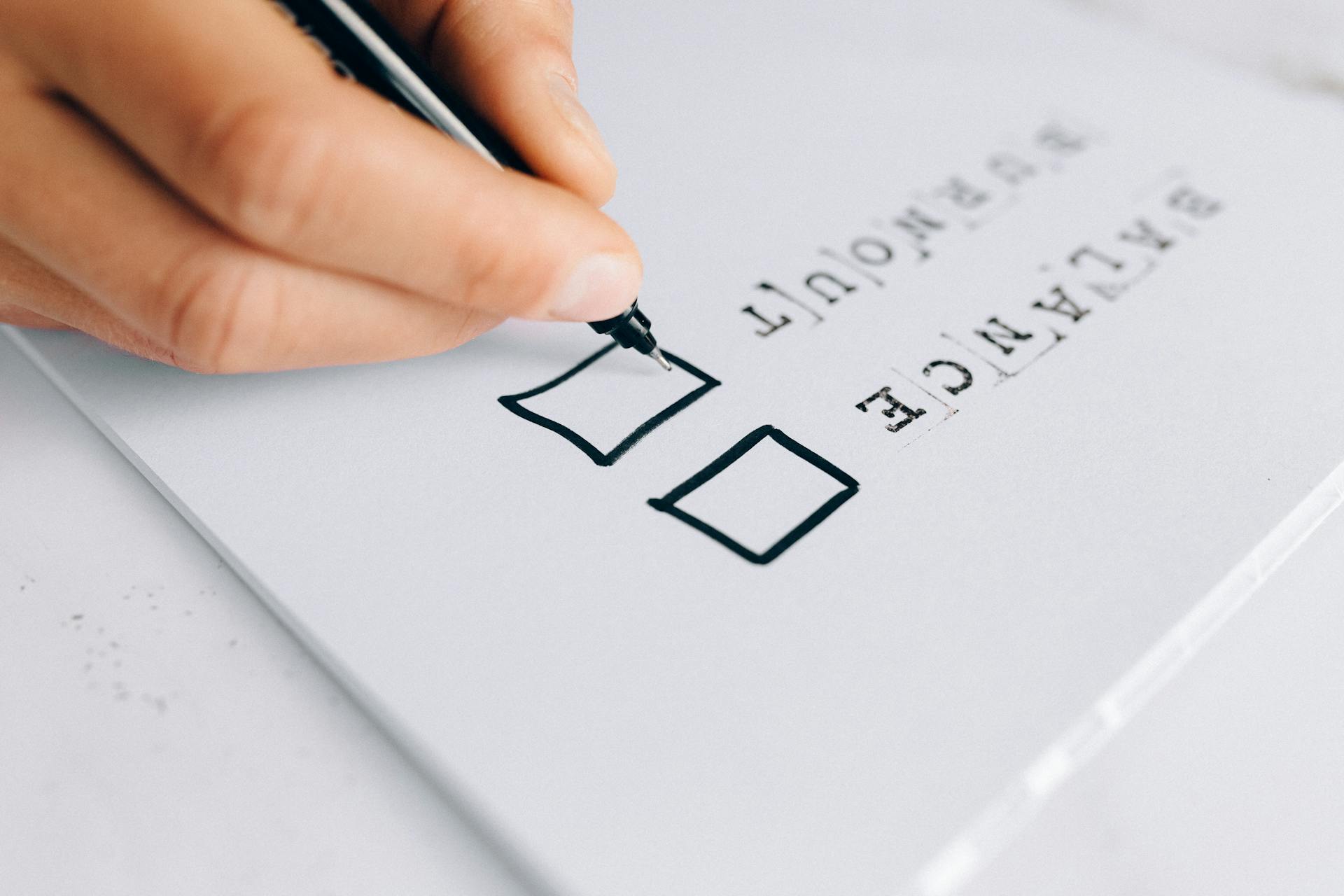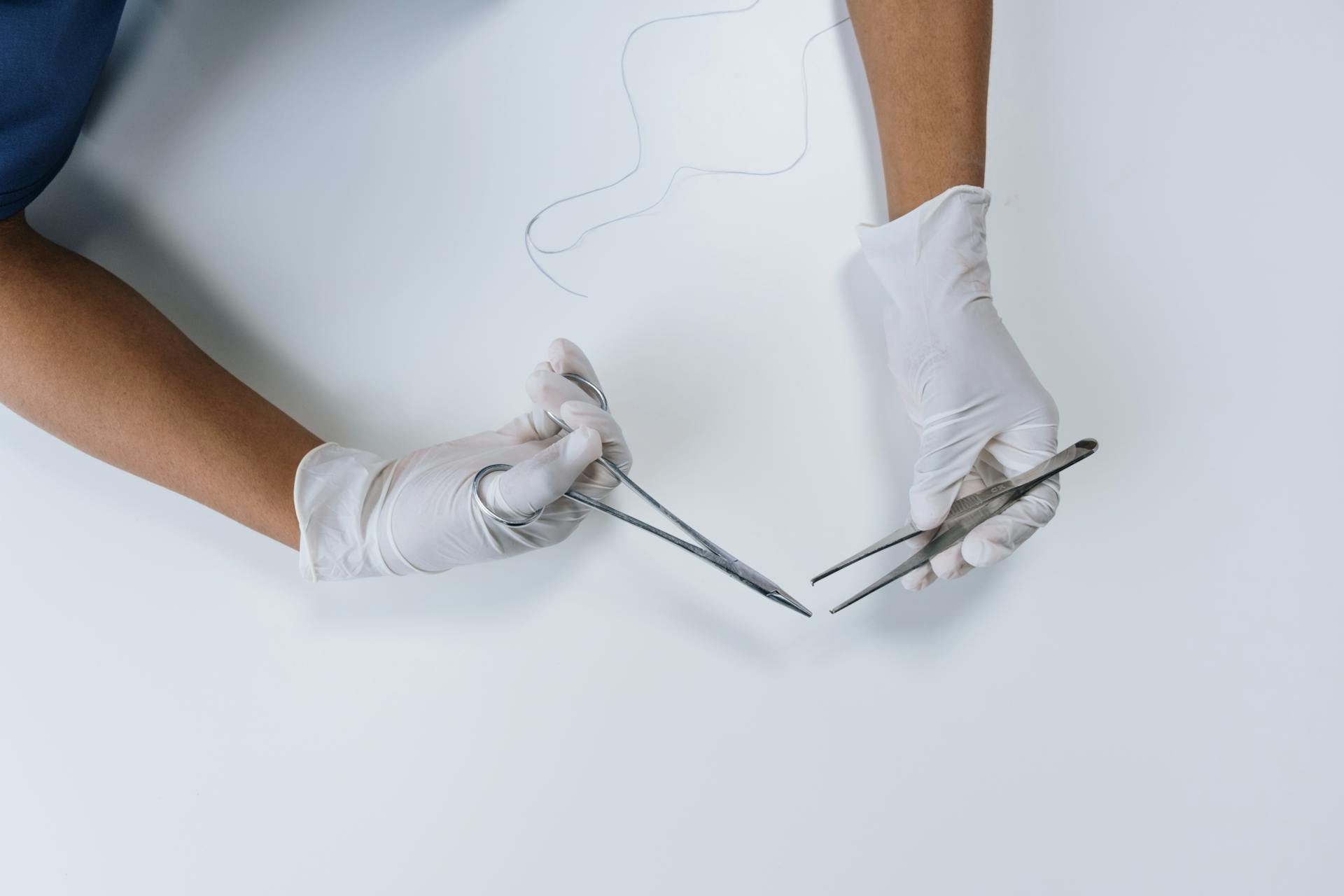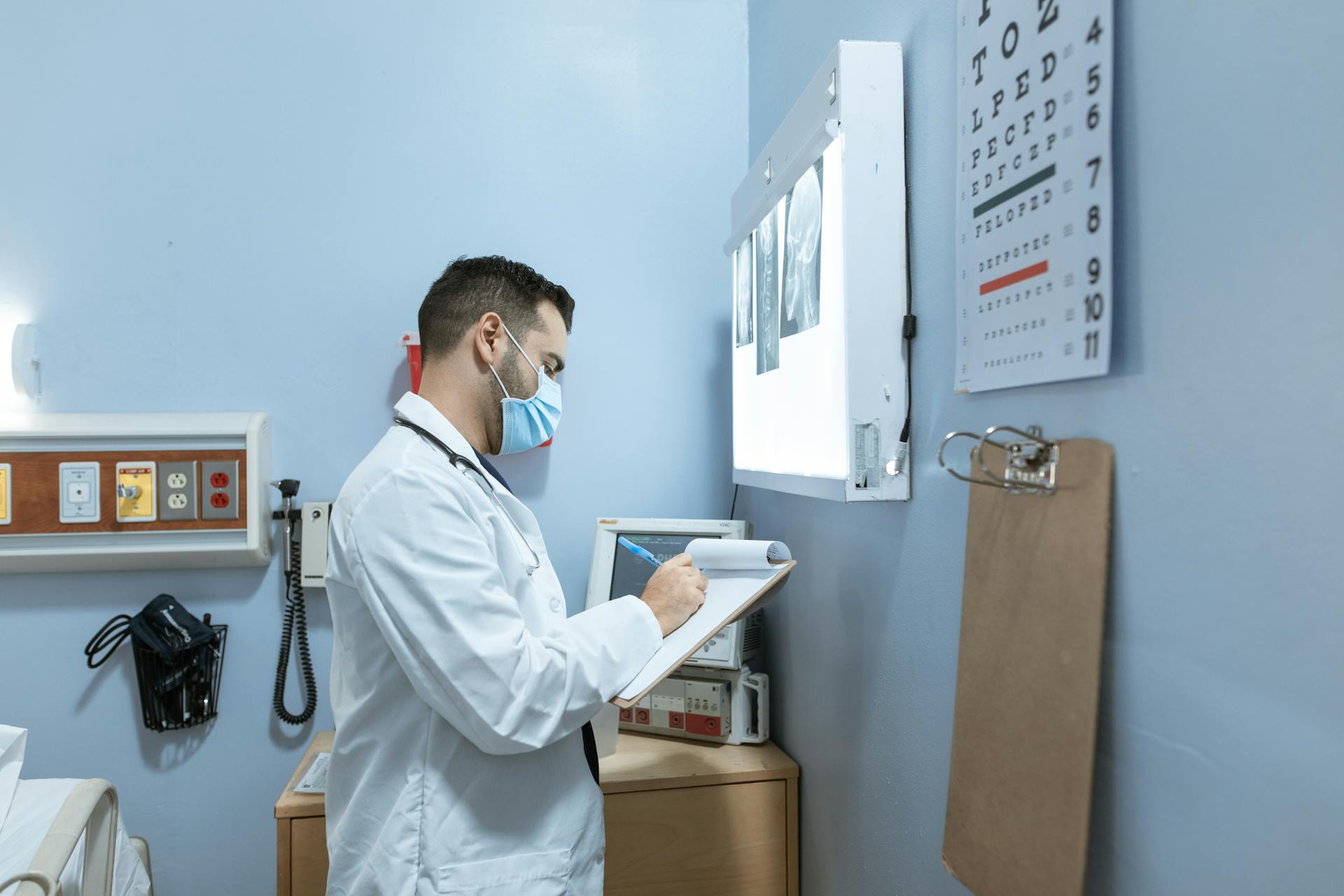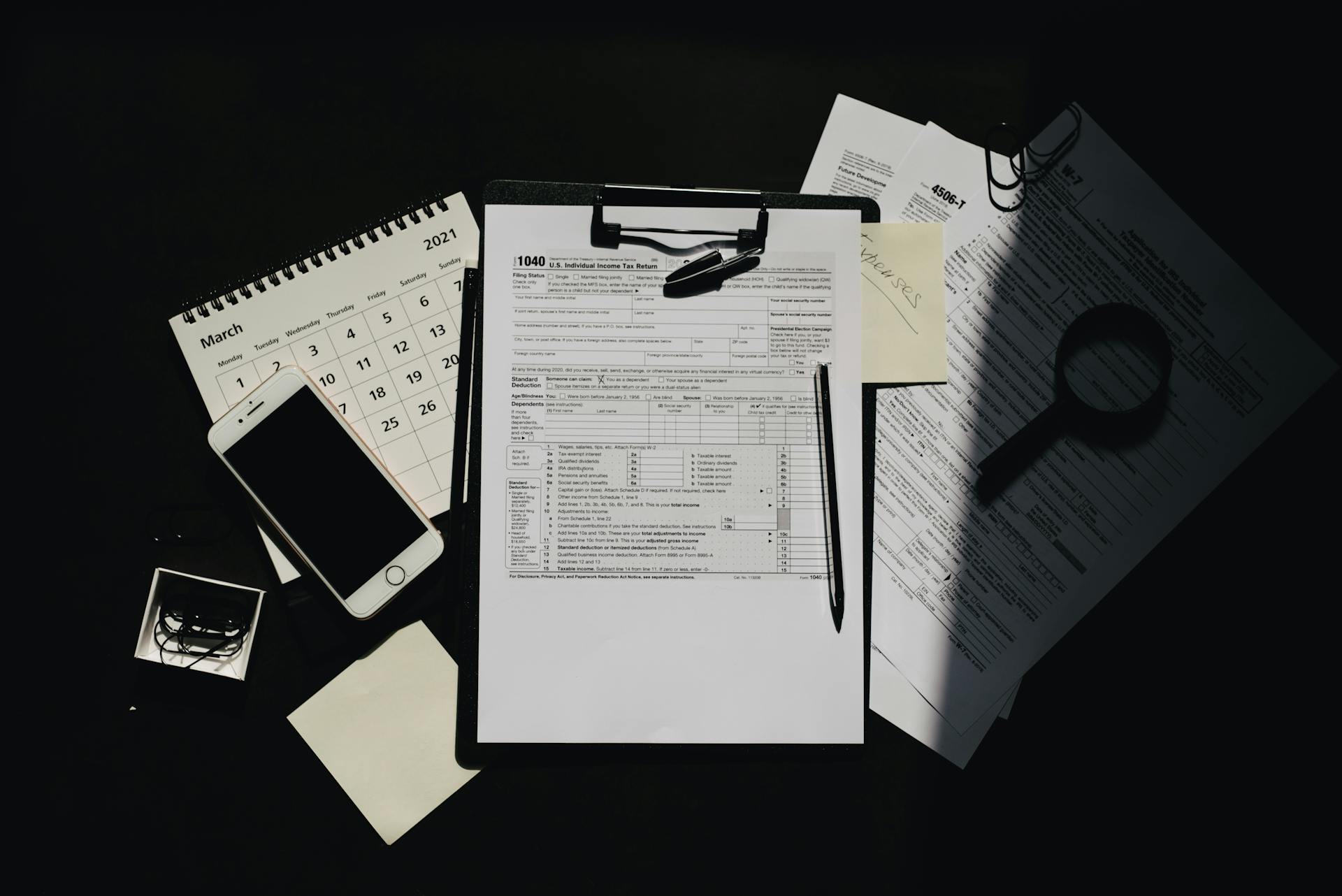
The HIPAA audit process is a crucial step in ensuring the security and confidentiality of sensitive patient information.
The Office for Civil Rights (OCR) is responsible for conducting HIPAA audits, which can be triggered by a complaint, a risk analysis, or a random selection process.
To prepare for a HIPAA audit, covered entities should have a thorough understanding of the HIPAA Security Rule, which outlines the administrative, technical, and physical safeguards required to protect electronic protected health information (ePHI).
A HIPAA audit typically involves a review of an organization's policies, procedures, and practices related to the handling and storage of ePHI.
For more insights, see: Security Standards Hipaa
What Is a HIPAA Audit?
A HIPAA audit is a thorough review of an organization's compliance with the Health Insurance Portability and Accountability Act of 1996.
The Office for Civil Rights (OCR) is responsible for conducting these audits, which can be triggered by complaints, self-disclosures, or routine audits.
The OCR may conduct a desk audit, which involves reviewing documentation and policies, or a on-site audit, which involves sending a team to the organization's site.
The goal of a HIPAA audit is to ensure that an organization is protecting the confidentiality, integrity, and availability of protected health information (PHI).
Organizations must be prepared to provide documentation and evidence of their HIPAA compliance efforts during an audit.
The OCR uses a risk-based approach to determine which organizations to audit, focusing on those with a history of non-compliance or those that handle large amounts of PHI.
A different take: What Constitutes Phi under Hipaa
Eligibility and Selection
HIPAA audits target covered entities and business associates that handle PHI and ePHI. This includes healthcare providers, health plans, and healthcare clearinghouses, while business associates are organizations or individuals that perform functions involving PHI on behalf of covered entities.
The selection process for HIPAA audits involves multiple triggers, including complaints or breach reports filed against a covered entity or business associate. The OCR may also conduct follow-up audits for organizations with a history of prior non-compliance.
The HHS selects organizations for HIPAA audits based on a range of criteria, including size, type, and geographic location. Random selection is also possible, even if there are no security breaches or complaints in your organization.
Related reading: Hipaa Business Continuity

Here are the selection criteria in a list format:
- Size of the organization – Whether it’s a small, medium, or large organization
- Type of the organization – Whether it’s a healthcare clearing house, a healthcare provider, or a health plan; public or private
- Random selection – You can be selected randomly too, even though there are no security breaches or complaints in your organization.
- Affiliation – Whether the organization is affiliated with any other healthcare organizations
- History with OCR – Whether the organization has had any interactions with the OCR in the past
- Geographic location – The OCR takes into consideration the geographical location of the organization
Who Is Eligible?
HIPAA audits are a serious matter, and it's essential to understand who's eligible for one. Covered entities, which include healthcare providers, health plans, and healthcare clearinghouses, are the primary targets.
These entities handle Protected Health Information (PHI) and Electronic Protected Health Information (ePHI), making them a high priority for audits. Business associates that perform functions involving PHI on behalf of covered entities are also at risk.
As a healthcare professional, I've seen firsthand how crucial it is for these entities to comply with HIPAA regulations. Business associates include organizations or individuals that work with covered entities to manage PHI, such as data storage companies or medical billing services.
HIPAA audits can have serious consequences for those who don't comply, so it's vital to understand who's eligible and take steps to protect sensitive information.
Discover more: Health Insurance Exchange Notice
How the Selection Process Works
The selection process for HIPAA audits is a bit complex, but I'll break it down for you. The OCR usually initiates audits in response to complaints or breach reports filed against a covered entity or business associate.

Complaints can come from patients or employees, and they can be about privacy violations or mishandling of PHI. These complaints can be a major trigger for an audit.
A breach of PHI that meets certain criteria will also lead to an audit. The OCR may also conduct follow-up audits for organizations with a history of prior non-compliance.
Random audits are rare and typically reserved for larger, established entities due to the OCR's limited resources.
Preparation and Compliance
To prepare for a HIPAA audit, you need to have a comprehensive program in place that includes tangible processes that support your policies. This means having a system and strategy in place to ensure compliance with all HIPAA regulations.
Appointing a HIPAA security and privacy officer is crucial, as they will oversee all HIPAA-related efforts, serve as the main point of contact for patients, employees, and regulatory agencies, and monitor privacy practices. They will also develop security measures, schedule regular policy reviews, and document any breach or incident. The officer must possess a comprehensive understanding of HIPAA Compliance and ensure the proper enforcement of security and privacy policies, reporting and investigating data breaches, and completing regular risk assessments.
You might enjoy: Hipaa Security Services

You should also implement policies and procedures to govern access to facilities that house information systems and e-PHI, and keep an inventory of your practice's facilities that house equipment that creates, maintains, receives, and transmits e-PHI. Regular employee training is also essential to educate your workforce on compliance policies, data security best practices, and the importance of safeguarding sensitive information.
Perform an Analysis
Performing an analysis is a crucial step in ensuring HIPAA compliance. You need to identify potential vulnerabilities and threats to your organization's processes, systems, and data.
A risk analysis involves carefully assessing these risks to develop effective mitigation strategies and implement necessary safeguards. This will help protect your organization from potential audit findings and ensure compliance with relevant regulations.
To perform a risk analysis, you should consider the types of risks that could impact your organization, such as human error, technical vulnerabilities, or environmental factors.
Some examples of risks to consider include:
By carefully assessing these risks, you can develop strategies to mitigate them and ensure the confidentiality, integrity, and availability of your organization's PHI.
How to Ensure Compliance

To ensure compliance with HIPAA regulations, you need to have a comprehensive program in place that includes tangible processes that support your policies. This program should be regularly reviewed and updated to ensure it remains compliant with changing requirements.
Assigning a Privacy and Security Officer is essential to compliance, as they will oversee all HIPAA related efforts, serve as the main point of contact for patients and regulatory agencies, and play a key role in workforce training and education.
A risk analysis is necessary to identify potential vulnerabilities and threats to your organization's processes, systems, and data. This will help you develop effective mitigation strategies and implement necessary safeguards to protect your organization.
You must also maintain detailed records of all improvements pertaining to the privacy and security of data, including compliance training sessions, entities having access to PHI, and policy revisions.
To ensure your organization complies with all HIPAA regulations, you need to implement policies and procedures to govern access to facilities that house information systems and e-PHI. You should also keep an inventory of your practice's facilities that house equipment that creates, maintains, receives, and transmits e-PHI.
See what others are reading: Hipaa Data Governance

Here are the key steps to ensure compliance:
- Appoint a HIPAA security and privacy officer
- Implement policies and procedures to govern access to facilities
- Keep an inventory of facilities and equipment
- Encrypt all data end-to-end
- Ensure all personnel adhere to strict guidelines governing PHI
- Implement a strict IT security policy
- Document all training and compliance efforts
- Regularly review and update policies and procedures
Regular audits and risk assessments are also crucial to identify potential vulnerabilities and non-compliance. You should also review all business associate agreements to ensure they accurately reflect current HIPAA requirements and cover all aspects of data protection.
Report All Breaches
Reporting a breach is a critical step in maintaining HIPAA compliance. If a breach occurs, you must act swiftly and responsibly to notify affected individuals, the Department of Health and Human Services, and potentially the media.
Your breach reporting procedures should be well-defined, outlining the steps to be taken immediately after a breach is discovered. This includes conducting a thorough assessment of the incident to determine the extent of the breach and the types of information involved.
A breach is defined as an unpermitted use or disclosure that compromises the security or privacy of PHI. Covered entities and their business associates must report all breaches of PHI to the OCR, which will typically consider several factors when deciding whether to start an audit after a breach.
If this caught your attention, see: A Breach under Hipaa

These factors include the nature and extent of the breach, the organization's prior compliance history, and the actions taken to mitigate the breach and prevent future incidents. Not all breaches will automatically trigger an audit, but employee mistakes, employee misconduct, third-party errors, and security incidents are common triggers.
Here are the main causes of data breaches in healthcare, which can lead to HIPAA audits:
- Employee mistakes: Many HIPAA audits are triggered by employee errors, such as falling for a phishing attack, not using strong passwords, or sending patients the wrong medical records.
- Employee misconduct: Employees sometimes intentionally violate HIPAA, whether for personal gain or out of curiosity. Examples include stealing patient records or accessing them without proper authorization.
- Third-party errors: If a business associate experiences a significant data breach, the covered entity will also be audited, as they are responsible for ensuring that their BAs follow HIPAA.
- Security incidents: Lost or stolen devices, particularly unencrypted ones, are a common security incident that triggers a HIPAA audit. Another trigger is unpatched software leading to malware or ransomware attacks.
In 2022, healthcare organizations worldwide faced a staggering average of 1,463 cyberattacks per week, an increase of 74% compared to the previous year. If you happen to discover a security breach, don't hesitate to report the same within 60 days.
Security Measures
To ensure the security of sensitive health information, implementing a robust network security infrastructure is crucial. This includes advanced firewalls, intrusion detection systems, and data encryption protocols.
Regular audits are essential to identify potential vulnerabilities and threats to your organization's processes, systems, and data. By conducting periodic audits, organizations can monitor their adherence to HIPAA policies and procedures, assess the effectiveness of their privacy and security measures, and make necessary adjustments to enhance data protection.
Role-based access controls (RBAC) are a key component of network security, ensuring that individuals within an organization have access only to the data necessary for their specific job functions. By assigning roles and permissions based on job responsibilities, organizations can minimize the risk of unauthorized access to ePHI.
For more insights, see: Hipaa Access Control
Document PHI Storage Locations
Documenting PHI storage locations is a crucial step in ensuring the security of sensitive data. This involves creating a comprehensive inventory of all physical and electronic storage sites, including servers, databases, file cabinets, laptops, and smartphones.
You'll want to make sure to include all types of storage, whether it's on-premise or in the cloud. Maintaining a thorough record of these locations helps demonstrate an organized approach to data management.
By doing so, you enable auditors to verify that proper security measures are in place to protect PHI at all times. This is essential for compliance and peace of mind.
Documenting PHI storage locations also helps you identify potential vulnerabilities and take steps to address them. It's a proactive approach to data security that pays off in the long run.
Consider reading: Why Is Hipaa Important in Healthcare
Perform Regular Checks
Regular checks are essential to ensure your organization's security measures are up to date and effective. This includes reviewing and updating HIPAA compliance policies and procedures to align with changing requirements and regulatory changes.
Reviewing and updating policies and procedures is crucial to ensure compliance. Regular reviews help identify potential vulnerabilities and threats to your organization's processes, systems, and data.
To perform regular checks, you should:
- Review business associate agreements (BAAs) to ensure they accurately reflect current HIPAA requirements and cover all aspects of data protection.
- Document all locations where PHI is stored, including physical and electronic storage sites, such as servers, databases, file cabinets, and portable devices.
- Perform risk analyses to identify potential vulnerabilities and develop effective mitigation strategies.
- Conduct regular self-audits to assess compliance with HIPAA policies and procedures.
- Review all business associate agreements (BAAs) to ensure they accurately reflect current HIPAA requirements and cover all aspects of data protection.
By performing regular checks, you can ensure your organization's security measures are effective and up to date. This includes upgrading your network security with advanced firewalls, intrusion detection systems, and data encryption protocols.
Regular audits also serve as valuable learning opportunities, fostering a culture of compliance and strengthening an organization's ability to respond confidently to official HIPAA audits.
Cost and Time
The cost of a HIPAA audit can vary depending on several factors, but if you're selected for an official audit by the Office for Civil Rights (OCR), there are no direct costs incurred by the audited organization.
However, there are indirect costs associated with preparing for the audit, such as hiring consultants, allocating staff time, and implementing any necessary improvements to achieve compliance. These costs can add up quickly, but it's worth noting that you can choose to perform voluntary self-audits using external or internal auditors, which may involve fees ranging from a few thousand to tens of thousands of dollars.

A HIPAA audit can take anywhere from several weeks to several months to complete, depending on the scope of the investigation, the size and complexity of the organization being audited, and the presence of external entities that may complicate and extend the investigation.
Here are some key factors to consider when it comes to the duration of a HIPAA audit:
- The scope of the audit
- The size and complexity of the organization being audited
- The presence of external entities, which complicates and lengthens the investigation
Keep in mind that the OCR usually provides advance notice before conducting an audit, informing the audited organization of the purpose, scope, and expected duration of the audit.
Cost
The cost of a HIPAA audit can be a significant concern for healthcare organizations. There are no direct costs incurred by the audited organization if they're selected for an official audit by the Office for Civil Rights (OCR).
Indirect costs, however, are a different story. Preparing for the audit can involve hiring consultants, allocating staff time, and implementing necessary improvements to achieve compliance, all of which can take a toll on an organization's budget.

The cost of hiring consultants can range from a few thousand to tens of thousands of dollars, depending on the scope and duration of the audit. This can be a significant expense for smaller healthcare organizations.
If an organization chooses to perform a voluntary self-audit, external auditors can charge fees ranging from a few thousand to tens of thousands of dollars, depending on the scope of the audit and the amount of time needed. This is an additional expense that organizations will need to consider.
How Long Does it Take?
The length of a HIPAA audit can vary, but on average, it takes anywhere from several weeks to several months to complete.
The duration of an audit depends on several factors, including the scope of the investigation, the size and complexity of the organization being audited, and the presence of external entities.
A HIPAA audit can take several weeks or several months, and the OCR usually provides advance notice before conducting an audit.
The audited organization is informed of the audit's purpose, scope, and expected duration, giving them time to prepare.
The presence of external entities can complicate and extend the investigation, making it take longer to complete.
If significant issues are identified, the audit process may take longer to ensure that the organization has implemented the necessary corrective actions.
Here's a breakdown of the factors that can affect the length of a HIPAA audit:
- The scope of the audit.
- The size and complexity of the organization being audited.
- The presence of external entities.
Consequences and Violations
HIPAA violations can incur significant fines and penalties, ranging from $127 to almost $2 million. Intentional or reckless violations can even result in imprisonment of up to 10 years.
Violating HIPAA can also lead to damage to your reputation, loss of trust among patients and stakeholders, and even loss of medical licensure or accreditation. A HIPAA violation will likely result in negative publicity, which can have long-lasting consequences.
You may face civil monetary penalties, ranging from $137 to $2,067,813, depending on the nature and severity of the violation. If the violations are intentional, you may even face criminal penalties, including potential imprisonment.
Consider reading: Hipaa Journal What Is a Hipaa Violation
Here are some common violations found by auditors:
What Will Be the Outcome?
The outcome of a HIPAA audit can be a serious matter. An organization may be required to correct identified compliance issues, which can be a time-consuming and costly process.
The audit may result in a warning letter or a formal resolution agreement, outlining the necessary steps to be taken to come into compliance. This can include revising policies and procedures, implementing additional safeguards, and providing training to staff.
A severe breach of HIPAA rules can lead to significant fines, with penalties ranging from $100 to $50,000 per violation, with a maximum of $1.5 million per year.
Consequences of Violation
Violating HIPAA can lead to severe consequences, including significant fines and penalties. The OCR may require the offender to take corrective action to address the violation and prevent future incidents.
Fines for HIPAA violations can range from $127 to almost $2 million, with intentional or reckless violations potentially resulting in imprisonment of up to 10 years.

A HIPAA violation can also damage the offender's reputation if the incident results in media attention, leading to a loss of trust among patients and other stakeholders.
In addition to fines and legal action, the OCR may issue corrective action plans (CAPs) that demand the offender adopt new policies as directed by the OCR. These CAPs also entail follow-up audits, with stricter penalties if the CAP is not adhered to.
Here are some examples of HIPAA violations:
- Sending a text message that contains PHI without using an encrypted form of transmission
- Accessing patient data on a personal mobile device or home computer
- Failure to remove access of former employees or current employees who no longer need to view PHI
- Lacking proper documentation of HIPAA compliance efforts within your organization
If you fail a HIPAA compliance audit, you may face:
- Corrective actions, including preparing a corrective action plan to address compliance inadequacies
- Civil monetary penalties, which can range from $137 to $2,067,813, depending on the nature and severity of the violation
- Criminal penalties, including potential imprisonment, if the violations are intentional
- Referral to the Department of Justice for further investigation
Preparation and Planning
To prepare for a HIPAA audit, it's essential to have a comprehensive compliance program in place. This includes assigning a Privacy and Security Officer who will oversee workforce training and education, ensuring all staff members are well-versed in HIPAA compliance.
A thorough risk assessment and management plan are also crucial, as they help identify vulnerabilities and develop strategies for prevention and response. This plan should be recorded in writing and kept in an accessible location.
On a similar theme: Hipaa Compliance Plan

To demonstrate your commitment to HIPAA compliance, create training modules for employees and document their progress and completion. This will be evident to the OCR during an audit.
Here are the key steps to take:
- Appoint a HIPAA security and privacy officer.
- Implement policies and procedures to govern access to facilities that house information systems and e-PHI.
- Implement physical protections to control and manage physical access to your facility.
- Keep an inventory of your practice’s facilities that house equipment that creates, maintains, receives, and transmits e-PHI.
Regular monitoring, training, and assessment are also necessary to ensure ongoing HIPAA compliance. This includes tracking mechanisms to capture and record relevant information, such as employee training records and risk assessment reports.
Here's an interesting read: Hipaa Training Video
Appoint a Privacy Officer
Appointing a Privacy Officer is a crucial step in preparing for a HIPAA audit. This individual will oversee all HIPAA-related efforts and serve as the main point of contact for patients, employees, and regulatory agencies.
The Privacy Officer plays a key role in workforce training and education, ensuring that all staff members are well-versed in HIPAA compliance. They will also monitor privacy practices and develop security measures.
In larger organizations, the role may be divided, with an Information Security Officer overseeing the company's security program. This is not a requirement, but it can be beneficial in ensuring that the organization is meeting its HIPAA obligations.
For your interest: Hipaa Compliance Officer

The Privacy Officer must also schedule regular policy reviews and document any breach or incident. This will help the organization stay on top of HIPAA compliance and ensure that any issues are addressed quickly.
Here are the key responsibilities of a Privacy Officer:
- Oversee all HIPAA-related efforts
- Serve as the main point of contact for patients, employees, and regulatory agencies
- Play a key role in workforce training and education
- Monitor privacy practices
- Develop security measures
- Schedule regular policy reviews
- Document any breach or incident
Before Getting the Notice
HIPAA is a set of laws that govern the protection of sensitive patient health information.
Passed in 1996, HIPAA has expanded since then to become a complex set of regulations for businesses.
Knowingly or unknowingly violating HIPAA can lead to hefty fines.
In 2020, Health Share of Oregon suffered a data breach when a laptop with unencrypted protected health information was stolen from a third-party vendor.
This incident highlights the importance of protecting patient data, and the potential consequences of non-compliance.
HIPAA compliance is a significant concern for businesses, as it can lead to jail time in severe cases.
Frequently Asked Questions
Are HIPAA audits random?
Yes, HIPAA audits will be random, targeting both covered entities and business associates. The OCR director confirmed that these audits will be conducted randomly later this year.
Does HIPAA require internal audits?
Yes, HIPAA requires covered entities and business associates to perform internal audits at least annually, but some organizations may choose to do so more frequently. Annual internal audits help ensure compliance with HIPAA regulations and protect sensitive patient information.
What happens if you fail a HIPAA audit?
Failing a HIPAA audit can lead to civil and criminal penalties, including potential referral to the Department of Justice for investigation
What is HIPAA compliance in IT industry?
HIPAA compliance in IT refers to the handling and protection of sensitive patient data, including electronic and physical records, in accordance with strict security standards. Ensuring HIPAA compliance is crucial for healthcare organizations to safeguard patient confidentiality and maintain trust.
What is included in an IT audit?
An IT audit involves assessing system security, verifying data integrity, evaluating risk management practices, and examining IT management processes. These key functions help identify areas for improvement and ensure IT systems are secure, reliable, and compliant.
Featured Images: pexels.com

